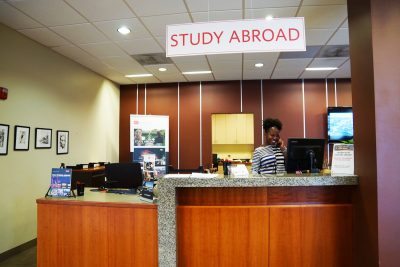
Boston University’s Study Abroad office is re-evaluating its programs to eliminate eligibility of courses and credits from several universities overseas. The re-evaluation process was prompted by reports from students and professors at these universities deeming the programs unsuited to BU curriculum.
David Lamitie, the associate director of BU Study Abroad, said the teaching of certain courses in European and Asian countries did not meet BU standards.
“As we gain experience with the individual programs and providers, we update our evaluations of the various programs and program providers,” Lamitie said. “Each year we have more information about programs and can make better judgments.”
These major re-evaluations have been happening for over five years, Lamitie said.
“We put considerable effort into ensuring that programs that we approve offer courses that are equivalent in quality, breadth and depth to BU courses,” Lamitie said.
The re-evaluated courses include programs in Ireland, Germany, the United Kingdom, Mexico, China and others, Lamitie said. However, previously accepted credits from these now denied programs will still be accepted.
Lamitie said students should ensure the program they want to attend is approved first by BU’s Study Abroad office and second by their specific college.
“Lots of students find a program, and it’s a fairly quick decision whether it would be acceptable for credit transfer to BU,” Lamitie said.
Scott Runner, a program manager in the Study Abroad office, is available as a full-time advisor to help students find acceptable programs, Lamitie said.
“He holds office hours 12 or more hours a week where he’ll sit down and help students determine if the program is acceptable,” Lamitie said.
Yi Wang, a senior in the Questrom School of Business, said she took classes at home in China freshman year that are no longer accepted by BU.
“I had a great experience there,” Wang wrote in an email. “I met students from different schools and got connected with professors who don’t teach at BU.”
Wang said she believes the decision is justified though, given the quality of some programs she has heard about in Asia.
“Some summer schools you don’t even have to go to class they will give you a passing grade,” Wang wrote.
Wang said as long as the classes are approved, she highly suggests studying abroad.
“I know some students want to go try to graduate early but still want to be able to go back home during the summer,” Wang wrote. “Therefore, taking classes in Asia would be the best bet for them.”
Several students said they were surprised to hear about the changes.
Ying Tung Lin, a freshman in the College of General Studies, said although she wasn’t previously considering taking external credits, she now feels slightly barred.
“My advisor did suggest to me that I could fulfill some credits at home, but I was not ever planning to,” Lin said. “If I do decide to do that to save time, then it might affect me.”
Lin said the quality of the education at schools in China is sometimes not up to BU’s standard.
“It’s really not that fair because they don’t really learn anything and they just fulfill the credits, so I get where the university is coming from,” Lin said. “Honestly, I would definitely be fine with that new policy,”
Yuanyuan Gui, a second-year graduate student in the College of Communication, said she has heard of students devaluing their learning experiences with study abroad programs that aren’t run by BU.
“Some of the students may not [think that] English [is] so important,” Gui said.”But I don’t think that will affect a lot.”
Julia Chang, a freshman in CGS, said she thinks discrediting English programs in Asia, which some students rely on to fill BU class requirements, might be unfair to students whose first language isn’t English.
“I feel like although the criteria for some courses might be different from BU,” Chang said, “BU should still accept the credits from schools that are not in the U.S.”
























































































































